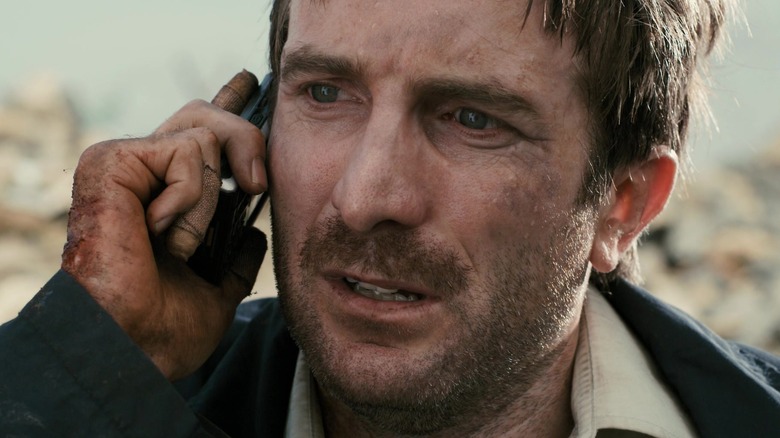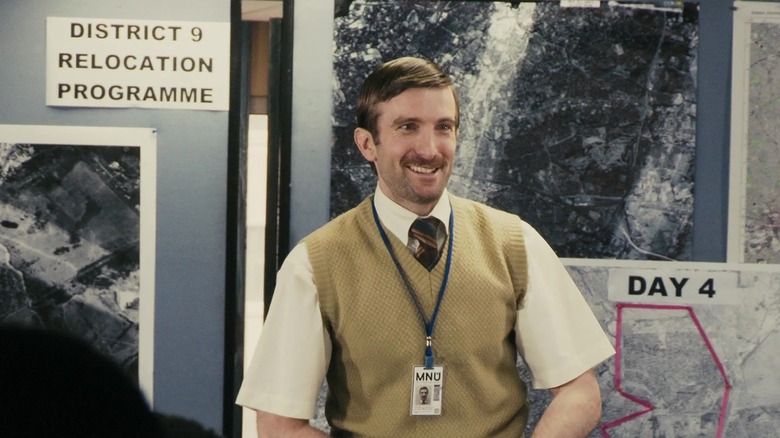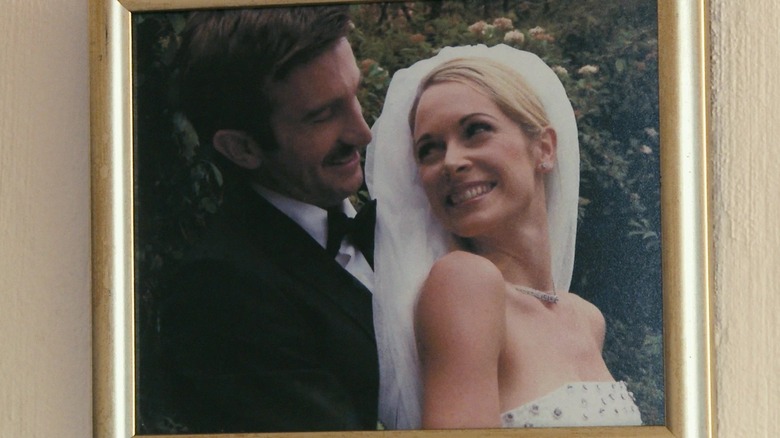District 9 Ending Explained: When Is Redemption Earned?
This post contains spoilers for "District 9."
Neill Blomkamp's "District 9" has no shortage of disturbing behavior. As the film progresses, we witness genocide, disenfranchisement, betrayal, and attempted cannibalism, along with a number of other disgusting acts. This might be par for the course in a lot of fictional works, but the horrors are made even more chilling by the fact that there are a lot of parallels between the treatment of the film's aliens and the real-life treatment of South Africa's migrant and otherwise disenfranchised populations.
While the depth of the film's connection to real-life oppression isn't immediately visible, it certainly makes the ending more complicated. At first glance, Wikus van de Merwe's (Sharlto Copley) potentially permanent transformation from human to alien seems like poetic irony. It's not every day that the head of a project to displace marginalized peoples becomes a member of that very group and is displaced in the process. That ought to teach the jerk, the film practically cheers — and frankly, it's hard not to join in.
For what it's worth, the transformation does seem to give Wikus some perspective. By the very end of the movie, he's helping Christopher and his son CJ board a spaceship so that they can return to their home planet and get help for the remaining aliens, despite the fact that Christopher is his only chance at reversing the transformation. But when you consider the fact that the film is rooted in real-life injustices, the question of redemption suddenly becomes much harder to resolve. What does redemption even look like in the face of such large-scale tragedies? Within "District 9," who is redeemed by the time the credits roll?
Atoning for sin
In the interest of simplicity, let's start with the only character who really goes through what could ostensibly be called a major redemption arc: Wikus himself. On a very basic level, Wikus' decision to help Christopher and CJ return to their home planet seems to put the aliens first. After all, he's giving the aliens a chance to call for backup and presumably escape their current state of oppression, even though it will lead to him spending (at least) three more years in alien form and further isolate him from his beloved wife.
Now, there's a separate argument to be made that Wikus might've simply helped the duo return home out of fear that Christopher wouldn't have reversed the transformation if he was trapped on Earth forever. After all, early in the film, we do see Wikus bargaining with aliens in bad faith to obtain eviction notice signatures. Crucially though, we also see a lot of his arrogant cockiness fall away as he transforms. While it's admittedly not out of the question that Wikus is helping Christopher out of self-interest, I'm not entirely sold on the theory, either.
On the other hand, it doesn't seem accidental that early in the film, Wikus obtains signatures through trickery, whereas by its end he is helping the aliens work towards their own plans for empowerment. He's respecting their autonomy and making major sacrifices to give them a chance at a better future. Few in "District 9" could claim to do the same.
It's dangerous to imply that someone who goes through a similar trajectory in real life would be totally redeemed, but in movies, morality tends to be a bit more reductive. Ultimately, Wikus ends the film in a pretty good spot, morally speaking — the best out of any major human character.
Ignorance is bliss
If Wikus' trajectory is a look at how agents of harm can or can't be redeemed, his beloved Tania raises some interesting questions about bystanders. Tania doesn't spend a ton of time on screen throughout "District 9," nor does she seem to know a whole lot about the specifics of alien abuse. Still, seeing as her father and husband both target the creatures at work, Tania certainly has a vested interest in the status quo — and is even willing to turn Wikus in to preserve it.
Now, "District 9" doesn't present Tania as a villain. If anything, she seems to be woefully misguided (frequently by her corrupt father). But if Christopher does indeed return and reverse Wikus' transformation, would Tania — who presumably saw the aliens as lesser than humans — happily accept her formerly non-human husband back into the family? Would she realize only then that the aliens' treatment was horrible (and, if so, what would that say about her)?
Ironically, even though Wikus committed far worse acts than Tania, "District 9" offers her less of a clear path to redemption. That's not to say that a morally justifiable path is out-of-reach for Tania in the movie's potential sequel, "District 10," but the ambiguity is frustrating — and, with a dash of morbid irony, reflects just how complex it can be to determine the degree to which blissfully disengaged (but not inherently malicious) civilians should be held responsible for their governments' harmful policies.


